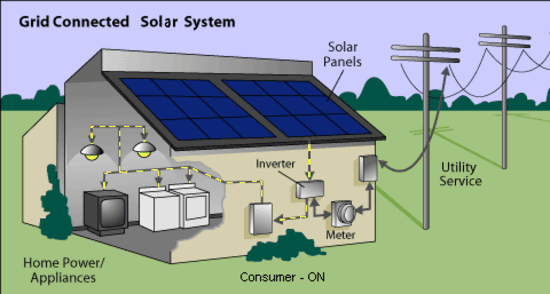
Solar energy is one more science fiction fantasy come true, and it joins ranks with the moon landing, orbiting satellites, nanotechnology and many other things we accept as commonplace.
We investigated how solar energy works and how and why it would interesting to install. First of all, what is solar-generated electricity, and where does it comes from? It comes from the energy of the light emanating from the sun, under the form of photons, which is captured by solar or photovoltaic panels which generate electricity using the photovoltaic effect.
Sunlight Vs Daylight
It is a common misconception that only direct sunlight can activate solar panels, when in fact daylight is sufficient. This means that solar panels work effectively even under a cloud cover, and that the crucial feature in assessing whether to install a solar panel system is exposure to daylight, rather than just direct sunlight. This is also because it is not the whole sunlight spectrum that can be converted into energy. Ultraviolet and infrared light for example are not useful, in fact a photovoltaic system typically converts between 15 and 17% of sunlight into actual energy.
In a solar panel system, photons are captured in solar panels, relatively thin “wafers” made of crystalline silicon or cadmium telluride and silicon. They are assembled in an array of several panels, usually mounted on a flat, glass-covered aluminium frame, which is then connected to an inverter that transforms the direct current produced into the alternate type useful for household and industrial purposes.
Where To Install A Solar System
Where is it feasible to install a solar energy system? Anywhere flat, with good exposure to sunlight and good weather generally (hot weather is not a requirement, in fact solar panels become less energy-efficient in the heat). The sunny side of a hill, a flat agricultural field with no houses or trees in the vicinity. The top of any residential building, especially if flat and no taller buildings overshadow it. The roof of a detached house is one of the most common locations, though also one of the most difficult to use, for several reasons. Roofs tend to be steep, so installing anything requires craftsmanship that’s sometimes expensive. A roof needs to be solid and tough, to take the weight of the system without structural damage risks. And finally the roof needs to have the proper orientation, East and South-East are obviously the best, North the worst, and to be clear of tall trees ad higher buildings.
The Benefits Of Going Solar
So why install a solar system if it is so difficult? In certain locations, think mountain huts for example, electricity may not be available through the conventional grid system. But if you have a “normal” house in an ordinary town or city neighbourhood, with plenty of power lines within easy reach, why go solar? We asked several people who have installed a solar panel system why they did it, and replies came from two main directions. The first is more philosophical: because by turning solar people want to reduce dependence from fossil fuel energy-generation systems, and do their own bit to preserve our overused planet.
The second direction is more prosaic: because solar energy is cheap, and because there are incentives to use it. The word “cheap” must be qualified. To install a single-home solar panel system in an average detached house in the UK costs between £ 7.000 and £ 10.000. The key to it is the fact that household energy bills, if the system works properly – and most of them do these days – can be reduced up to 40%. An average detached house where the energy bill (electricity plus hot water) is around £ 1000 a year on national grid, can save up to £ 400 pounds a year by going solar. Given that the government provides incentives which can reduce the installation cost, it is clear that the household in question can expect to amortize the initial cost in between 10 and 15 years, not an unreasonable time period. All the while, saving on energy bills and creating greater liquidity.
So it is time to look up to the sun and start converting its huge energy into energy we can use.
This post is written by Mark Jenkins and he works at CouponAudit as a writer, where thousands of valid and working online coupons are available for different stores. For example you can use soap.com coupon, petcarerx coupon etc. to get discount on your order while shopping on that store.









Thanks For This Informative post. It Helps All Those People Who Are Confused to choose solar panels but now they can buy that easily through your great info.